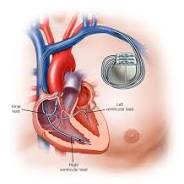Pacemaker Surgery: Understanding the Procedure and Recovery
For individuals with certain heart conditions, pacemaker surgery can be a life-saving intervention that helps regulate the heart’s rhythm and improve overall quality of life. Here, we delve into the details of pacemaker surgery, from the procedure itself to what to expect during recovery.
The Procedure
Pacemaker surgery is typically performed under local anaesthesia, meaning the patient is awake but does not feel pain in the area where the pacemaker will be implanted. The surgeon makes a small incision near the collarbone and inserts the pacemaker leads into a vein, guiding them to the heart. The leads are then connected to the pacemaker device, which is placed under the skin near the collarbone.
Recovery
After pacemaker surgery, patients are usually able to return home on the same day or within a day or two. It is common to experience some soreness or bruising around the incision site, which should subside within a few days. Patients are advised to avoid strenuous activities for a few weeks to allow proper healing.
Follow-up appointments with healthcare providers are essential to ensure that the pacemaker is functioning correctly and that any adjustments needed are made promptly. It is important for patients with pacemakers to follow their healthcare provider’s instructions regarding activity levels, medications, and regular check-ups.
Conclusion
Pacemaker surgery is a well-established procedure that has helped countless individuals manage heart conditions and lead fulfilling lives. By understanding what to expect during and after pacemaker surgery, patients can approach the process with confidence and peace of mind.
Understanding Pacemaker Surgery: Addressing Common Concerns and Questions
- Is pacemaker surgery high risk?
- What are the side effects of pacemakers?
- What is the age limit for a pacemaker?
- What is the recovery time for a pacemaker?
- How serious is a pacemaker operation?
- Can I live 20 years with a pacemaker?
Is pacemaker surgery high risk?
Pacemaker surgery is generally considered a low-risk procedure with a high success rate. While all surgeries carry some level of risk, complications from pacemaker implantation are rare and often minor. The benefits of having a pacemaker to regulate the heart’s rhythm and improve quality of life typically outweigh the potential risks associated with the surgery. It is important for patients to discuss any concerns they may have about the procedure with their healthcare provider, who can provide personalised information based on individual health factors and circumstances.
What are the side effects of pacemakers?
Pacemakers are life-saving devices that can greatly improve the quality of life for individuals with certain heart conditions. While pacemakers are generally safe and well-tolerated, there are some potential side effects to be aware of. Common side effects of pacemakers may include infection at the implant site, bruising or soreness near the incision, and a small risk of bleeding or swelling. In rare cases, patients may experience complications such as allergic reactions to the device materials or issues with lead placement. It is important for patients to discuss any concerns about side effects with their healthcare provider before and after pacemaker surgery to ensure proper monitoring and management of any potential issues.
What is the age limit for a pacemaker?
The age limit for receiving a pacemaker is not strictly defined and varies depending on individual health factors and the specific needs of each patient. While age alone is not a determining factor, healthcare providers consider various aspects such as overall health, life expectancy, and the potential benefits of pacemaker implantation when determining candidacy for the procedure. Therefore, it is essential for patients to consult with their healthcare provider to assess their suitability for a pacemaker based on their unique medical history and circumstances.
What is the recovery time for a pacemaker?
The recovery time for a pacemaker procedure can vary depending on individual factors, such as overall health and the specific circumstances of the surgery. In general, most patients can expect to resume normal activities within a few days following pacemaker implantation. However, it is important to follow the advice of healthcare providers regarding post-operative care and restrictions on physical activities to ensure proper healing and optimal functioning of the pacemaker. Regular follow-up appointments are typically scheduled to monitor the pacemaker’s performance and make any necessary adjustments.
How serious is a pacemaker operation?
A pacemaker operation is considered a relatively safe and routine procedure, with a high success rate and low risk of complications. While any surgery carries inherent risks, the overall seriousness of a pacemaker operation is generally low compared to the potential benefits it offers in managing heart rhythm disorders. Skilled healthcare professionals, including cardiologists and cardiac surgeons, oversee the entire process to ensure optimal outcomes for patients. It’s important to discuss any concerns or questions about the procedure with your healthcare provider to gain a better understanding of what to expect before, during, and after the surgery.
Can I live 20 years with a pacemaker?
It is not uncommon for individuals to live 20 years or more with a pacemaker. Advances in medical technology have significantly improved the durability and longevity of pacemaker devices, allowing patients to lead active and fulfilling lives for extended periods. Regular monitoring and follow-up appointments with healthcare providers are essential to ensure that the pacemaker continues to function optimally and meets the individual’s specific needs over time. With proper care and maintenance, many patients can enjoy decades of improved heart function and overall well-being with a pacemaker.

